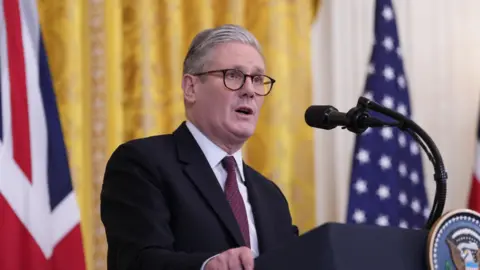The recent handling of international trade relations by UK Prime Minister Sir Keir Starmer marks a notable progression on the global stage, particularly in the context of the newly formalized deal with the United States. As trade talks have long been overshadowed by the wider implications of President Donald Trump’s tariff policies, the UK has found itself navigating these turbulent waters with renewed vigor. The culmination of these negotiations signifies a major breakthrough, one that sets Starmer’s administration apart from previous governments, notably those led by the Conservative Party.
For quite some time, discussions surrounding a potential trade deal were underway, yet uncertainties lingered regarding when, or if, President Trump would authorize any agreements shaped by his negotiating team. This week saw a definitive shift; Trump granted his approval, transitioning discussions into actionable agreements. This is especially timely given that it follows closely on the heels of a comprehensive free trade agreement achieved between the UK and India, signaling a vibrant expansion of the UK’s trade relations.
The UK-India free trade agreement is projected to enhance bilateral trade by an estimated £25.5 billion and contribute approximately £4.8 billion to the UK’s annual GDP. This agreement is indicative of a trend that Starmer’s administration aims to establish – one that seeks robust partnerships with economic powerhouses, thereby alleviating the adverse impacts of past tariffs instituted by Trump. This was likely motivated by the UK’s pressing need to rejuvenate its economy in the wake of Brexit and the pandemic.
Starmer’s recent success is markedly crucial considering the pressures of domestic politics. The Labour Party suffered setbacks in local elections, causing many to scrutinize Starmer’s strategy going forward. By securing a trade deal with the US, Starmer not only counters the narrative of his leadership challenges but also positions his government as a facilitator of beneficial international agreements, thus buoying confidence in Labour’s broader economic vision.
President Trump’s social media posts hinting at a “major trade deal” created anticipation on both sides of the Atlantic. However, upon closer inspection, the terms of this agreement may be more specific to the reduction of tariffs on certain goods rather than encompassing a broader free trade agreement. The US remains the UK’s primary trading partner, with British exports to the US nearing £200 billion. Currently, the UK exports face a standard 10% tariff, with particular sectors like steel, aluminum, and automotive facing steeper tariffs. There is a consensus on both sides to adjust these tariffs, emphasizing the significance of cooperation between the nations.
Opposition voices, like that of Andrew Griffith, the shadow business and trade secretary, have highlighted caution, stressing the importance of ensuring the deal aligns with national interests and is adequately scrutinized by Parliament. Similarly, Liberal Democrat spokesperson Daisy Cooper has called for a rigorous parliamentary vote on the negotiated terms to safeguard essential sectors, notably the National Health Service and agriculture from adverse impacts associated with this new deal.
The very act of Starmer engaging with Trump, a figure many had anticipated would be contentious for UK leadership, now serves as a political advantage, reinforcing his position. The relationships formed amid challenging international dialogues may yield substantial dividends for UK trade policy in the long run.
In summary, the recent trade deal representing a culmination of negotiations between the UK and the US highlights a significant achievement for Prime Minister Sir Keir Starmer. As the UK continues to redefine its global trade relationships post-Brexit, the successful navigation of both the US and India deals marks a strategic pivot towards being a competitive player in the international arena, purportedly easing previous political and economic strains stemming from Trump’s tariffs. The ramifications of these agreements could very well dictate the trajectory of the UK’s economic policies and international standing for years to come.



